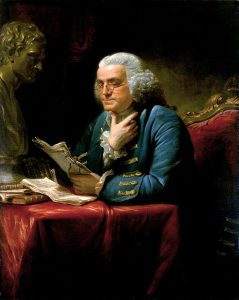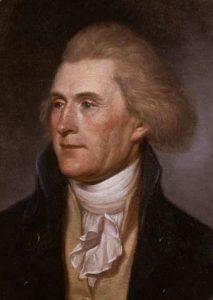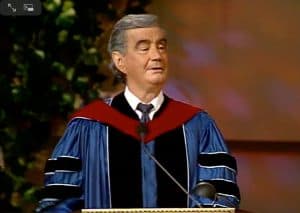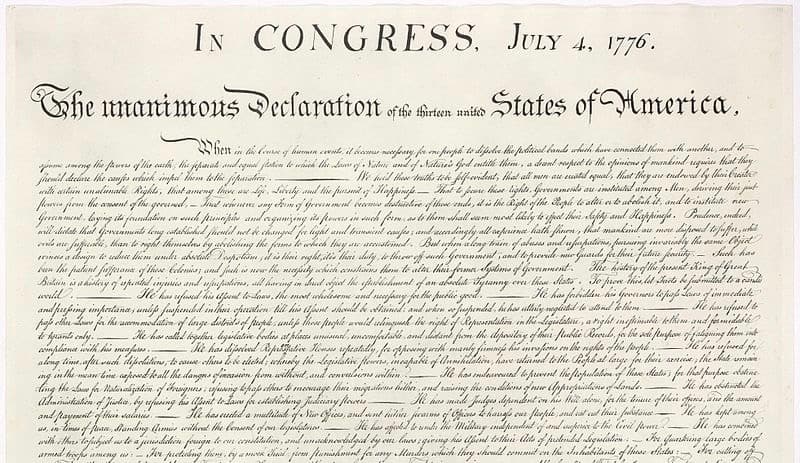The complete article is available here.
Principle 2: Absolute truths exist and are knowable.

“We hold these truths to be sacred and undeniable,” Thomas Jefferson wrote. Honing in on and sharpening one aspect of the ideas these two adjectives highlighted together, the final document reads, “We hold these truths to be “self-evident.…” Most historians believe Benjamin Franklin initiated this change, but the question of who should be credited with it probably isn’t the most valuable nugget worth mining here.

Jefferson’s term sacred underscored God’s involvement in human affairs through divine bestowal of unalienable rights. This was an element the final version would explicitly emphasize only a few words later. His term undeniable highlighted the Founders’ perspective that the truths being upheld had to be acknowledged, but the reality of the day was that, in fact, “many people…did deny that mankind has unalienable rights. All the deniers would have to do to refute the claim is simply disagree; nothing more would be required.” By contrast, the term self-evident put the onus back on those inclined to claim unalienable rights were not real. A self-evident truth, by its very existence, rightly claims that those who deny it are foolish. Now, they may be deceived, and therefore worthy of sympathy and compassion—but sympathy and compassion are neither authentic nor helpful if people avoid or water down the truth. The idea that a biological man actually can be a woman, or that a biological woman can legitimately identify as a man, is an example of a modern falsehood that must be countered with the truth. This and many other leftist ideologies demonstrate with utter clarity just how far Americans have drifted away from the beliefs the Founders upheld.
This is not to say that all self-evident truths are equally self-evident. Nor is it to say that all such truths are equally self-evident to all people. We’ve noted already that “many people” in the second half of the 18th century “did deny that mankind has unalienable rights.”
The Founders’ recognition of self-evident truths—that alone—attests to their holding a biblical worldview. Alvin J. Schmidt writes that the term self-evident
has Christian roots going back to the theological writings of the eighth century. To the medievalists, “self-evident” knowledge, says Gary Amos, “was truth known intuitively, as direct revelation from God, without the need for proofs. The term presumed that man was created in the image of God, and presumed certain beliefs about man’s rationality which can be traced as far back as Augustine in the early fifth century.1 Amos also shows that St. Paul in the Epistle to the Romans wrote that since the creation, even to the pagans, God’s “invisible attributes are clearly seen” (Romans 1:20 NKJV), that is, self-evident. In the previous verse, Paul says that these truths are phaneron estin en autois (evident by themselves). Thus, it is quite plausible that Paul’s biblical concept of “self-evident” knowingly or unknowingly influenced Jefferson [and the others] when he [—they—] declared, “We hold these Truths to be self-evident.”2

Even though not all the Founders were Christians, many were. Dr. D. James Kennedy indicates that the late Dr. M. E. Bradford of the University of Dallas, through his research, determined that fifty and perhaps fifty-two of the fifty-six signers of America’s founding document were “Trinitarian Christians.” That’s not all, either! Dr. Kennedy says as well that other experts “note that 29 of them had the equivalent of seminary degrees.” Try finding that many theologians in a group of politicians today! This was the case despite the fact that only one signer—John Witherspoon—was a pastor.
Regardless of how many of the 56 truly were believers, it is undeniable that on the whole they held to a biblical, or we could say a Christian, worldview. Consequently, they readily understood that certain rights are God-given, and therefore unalienable and inherent.
This page is part of a larger article.
Copyright © 2019 by B. Nathaniel Sullivan. All rights reserved.
